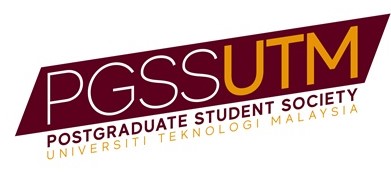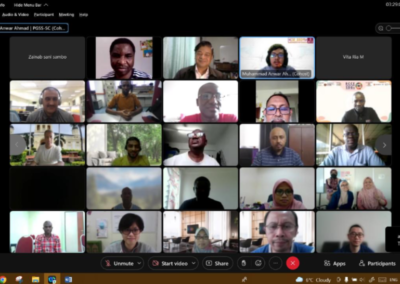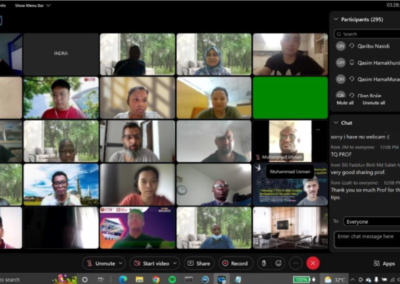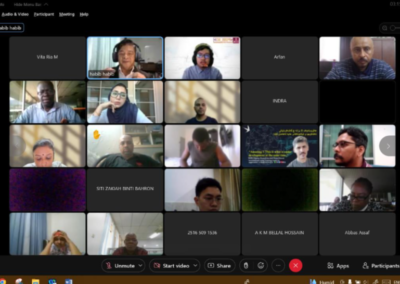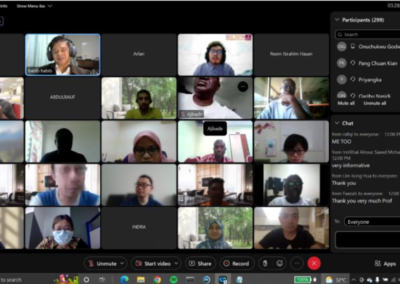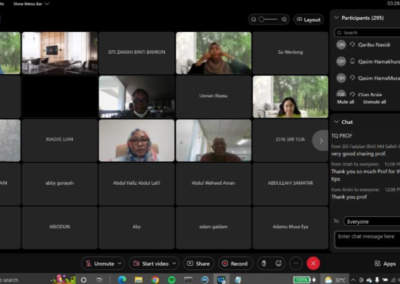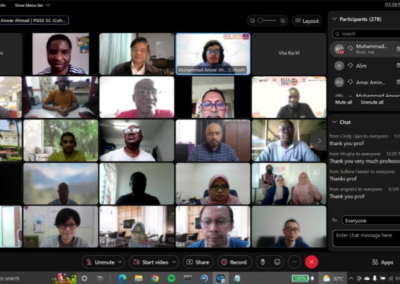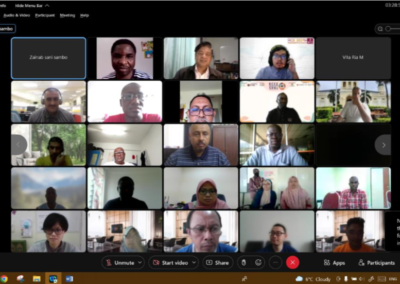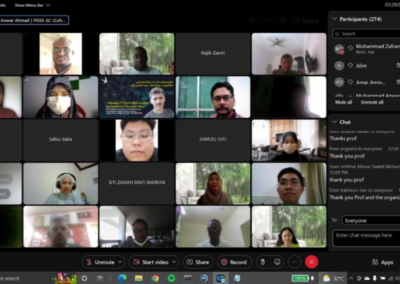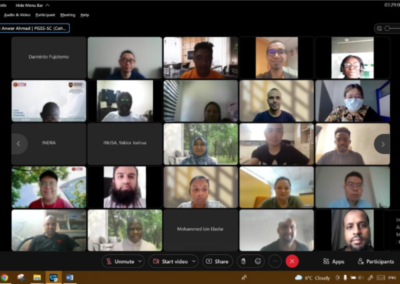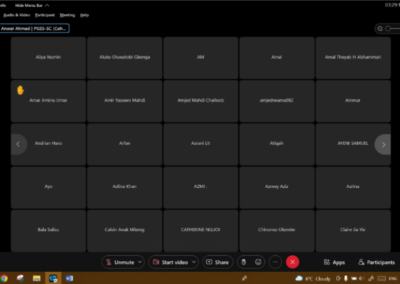31 May, Johor Bahru – On 31st May 2022, an online structured course How to Deliver The Perfect Viva By An Experienced PhD Examiner was organised to share on having a smooth Viva day. The course is held using Cisco WebEx online conferencing platform. This course was planned to start at 10 am; however, it was delayed due to technical issues. This course was organised succesfully by the Postgraduate Student Society School of Computing (PGSS-SC) with Muhammad Anwar Ahmad as the moderator with the PGSS-SC committee’s help, Muhammad Zafran Muhammad Zaly Shah, Asraful Syifaa’ Ahmad and Muhamad Farhin Harun.
This course received 518 online registrations, and 359 participants turned up for the event that had registered. There are 79.3% PhD level participants, 14.2% Master’s degree level participants, and 6.4% mixed categories of participants. We also received participation from UTM staff. Additionally, 80.5% are from UTM, and the rest are non-UTM and alumni.
The honourable speaker for the program is Prof. Habibollah Bin Haron. Prof. Habibollah Bin Haron is one of the professors in the School of Computing, Faculty of Engineering, Universiti Teknologi Malaysia (UTM). Previously, he is seconded as President of Qaiwan University (QU), Sulaymaniyah, Kurdistan-Iraq. This secondment is part of the commitment from UTM to ensure the success of the QU-UTM Franchise as part of UTM’s Trans-National Education agenda. He received a Bachelor of Computer Science from UTM in 1989 and a Master of Science in Computer Technology in Manufacture from the University of Sussex, UK in 1995. In 2004, he received his PhD in Computer Science, specialisation in Computer Aided Geometric Design (CAGD) area from UTM. He has stayed 2 years in Cardiff University, UK as part of his research program attachment for his PhD program. He has research experience in robotic, image processing, artificial intelligence, computer vision, and computer-aided geometric design. Since big data analytics and data science emerged, he has been actively involved in this research area.
He is actively appointed as the keynote speaker for many international conferences, international journal reviewers, international and local research grants, and examiners for PhD and MPhil thesis for Malaysian and international universities. He has been a Principal Investigator of many research projects, including the RISE European Research Council project and national and UTM research grants. His philosophy in an academic career is to balance the higher institution’s management and excel in research activity. According to the UTM Scholars website, Prof. Habib had 143 publications, where 74 out of them were indexed, and Prof also had 65 students under his supervision.
The course starts at 10.10 am, with the moderator briefly introducing the speaker, Prof. Habib’s background. Then, the floor was given to the speaker. He began with simple greetings to all the participants and told us he was delighted to share his knowledge and experience as examiner, chairman, and supervisor. He gave some short encouragement about the examiner wants to help the students improve their thesis and get good grades. He emphasised that a perfect viva is not the same as an ideal thesis, moving on to the slides. A perfect viva is a combination of good communication skills, properly defending the thesis, and the thesis’s quality. Next, he mentions the common principles of a PhD: knowing your field thoroughly, making a useful contribution, mastering appropriate techniques, learning their limitation, and communicating professionally. He also stressed that a PhD is about perseverance and maintaining the effort until the finish.
The speaker explained the purpose of the viva, an oral defence of the research and knowledge of the academic area. Viva is also an opportunity to discuss the work with experts and improve the arguments and the thesis. He then mentions that the examiners want the students to know what they have done and what they know about the subject area. They test the students’ knowledge of the general topic and the foundations of understanding of the topic. Next, he listed what the examiners do before the viva. They will read the thesis, identify the typos and look for material that is unclear, poorly presented or possibly wrong. They will also mark points for asking the students, sometimes with post-it notes. Some examiners are very detailed about the key issues, and students must prepare to answer them. They will also check on previous works.
The next slide covers what the viva should allow, meaning the common process during the viva, with four main points. It will enable students to defend their thesis and clarify anything raised by examiners. It will also allow the examiners to probe the students’ knowledge in the field, assuring that it is the students’ work and to come to a definite conclusion about the outcome of the examination. The examiners also want to make sure the thesis contents are correct and not the wrong theory or foundation.
Moving on to the next slide, he talked about preparing before the viva day. To summarise, a student should re-read the thesis, prepare example answers and take some notes, have a mock viva with peers and supervisor and study the background of the examiners to know about their attitude during the viva day. The speaker did give the example of common styles of the examiner; for example, the examiner is as very detailed and inspects every word and phrase; the examiner is also adversarial that cause a, challenging the students’ views to hear their argument and also being friendly and interested, which means they will make the students feel at ease and calmly explain their research.
Next, he talked about what happens on the viva day. It began with the student’s preparation. First, be moderate on the wear. He advises buying new clothes to be fresh. Next, the student should be early, bring a drink and wear a watch. The students should expect to be nervous but try to deal with it positively. Finally, students should bring a pad and pen but don’t expect to take many notes as the chair assistant will record every minute of what happens during the viva. The next slide mentions the common persons in the viva room for UTM, which includes the student, the chair and assistant, two internal examiners, one external examiner, supervisor and co- supervisors, and sometimes a representative from the School if needed for certain cases. On the next few slides were some tips during the viva, including staying calm, answering assertively but not being defensive, being confident, discussing the answers, and not rushing the answers. According to the UTM grading, he listed some possible questions that examiners will commonly ask and the list of possible results from the viva.
The final slide covers the participants’ expectations after the structured course session. He mentioned that the participants should have a clear idea of the structure the viva normally has. Participants should also understand what examiners will be looking for from the viva and what they need to do in preparation for the viva. They should also have a better idea of demonstrating their knowledge and understanding in the viva session. The speaker’s session ended around 11.40 am. Afterwards, a Q&A session was held until about 12.15 pm. Many excellent questions were collected, but as time was limited, the moderator could only pass some selected questions to the speaker, and he managed to answer all the assigned questions. Overall, aside from the technical issue initially, the structured course was held without any major issues.
To conclude, the participants appreciate all the efforts by the SPS UTM and PGSS SC as the organisers, and some suggested doing a hands-on session about using the software since it can get overwhelming to learn from an online course. Additionally, 353 out of the 359 participants rated this structured course 4 and 5 stars in terms of the overall rating. The participants are very satisfied with Prof. Habib’s explanation and insight into this topic from the feedback. This course outcome will boost the motivation for PGSS SC to organise more workshops like this.
